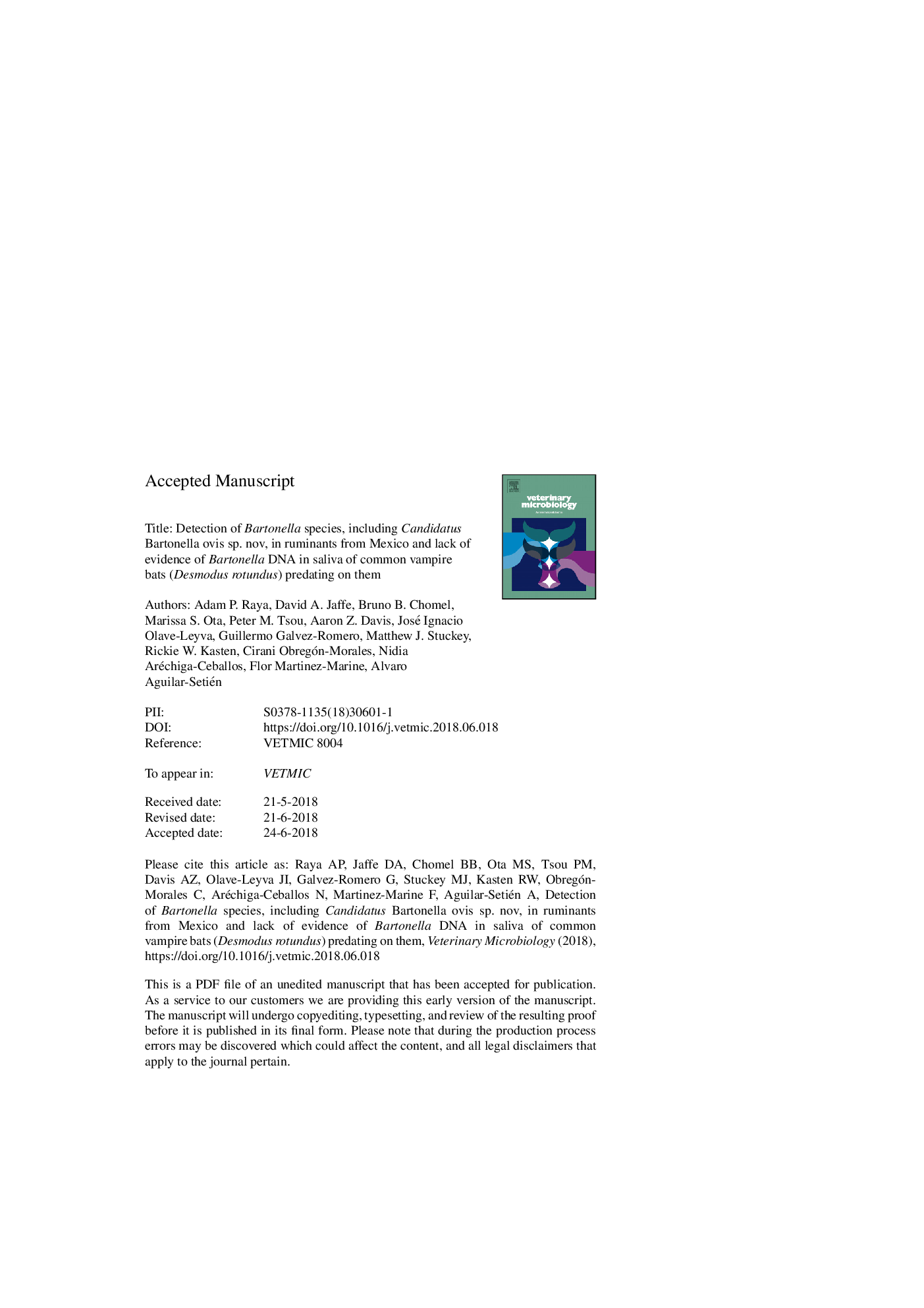| کد مقاله | کد نشریه | سال انتشار | مقاله انگلیسی | نسخه تمام متن |
|---|---|---|---|---|
| 8505154 | 1555301 | 2018 | 23 صفحه PDF | دانلود رایگان |
عنوان انگلیسی مقاله ISI
Detection of Bartonella species, including Candidatus Bartonella ovis sp. nov, in ruminants from Mexico and lack of evidence of Bartonella DNA in saliva of common vampire bats (Desmodus rotundus) predating on them
دانلود مقاله + سفارش ترجمه
دانلود مقاله ISI انگلیسی
رایگان برای ایرانیان
کلمات کلیدی
موضوعات مرتبط
علوم زیستی و بیوفناوری
علوم کشاورزی و بیولوژیک
علوم دامی و جانورشناسی
پیش نمایش صفحه اول مقاله

چکیده انگلیسی
Bartonella spp. have been identified in many bat species worldwide, including the zoonotic species, Candidatus Bartonella mayotimonensis. The common vampire bat (Desmodus rotundus) preys preferentially on livestock in Latin America and is frequently infected with Bartonella spp. To determine the potential role of D. rotundus in transmitting Bartonella to livestock, common vampire bats and bat-bitten domestic ruminants from Mexico were tested for Bartonella infection by blood culture or conventional PCR. Furthermore, to explore the possibility of bite transmission during blood feeding, saliva swabs from 35 D. rotundus known to be either Bartonella bacteremic (Nâ¯=â¯17) or blood culture negative (Nâ¯=â¯18) were tested by PCR to detect the presence of Bartonella DNA. Twenty (17.1%) of 117 sheep and 16 (34.8%) of 46 cattle were Bartonella bacteremic by PCR testing. However, none of them were infected with Bartonella strains previously isolated from vampire bats and none of the 35 D. rotundus saliva swabs tested were PCR positive for Bartonella. All but two animals among those which were Bartonella culture and/or PCR positive, were infected with either B. bovis (cattle) or B. melophagi (sheep). Two sheep were infected by a possible new species, Candidatus Bartonella ovis, being phylogenetically closer to B. bovis than B. melophagi. This study does not support the role of D. rotundus as a reservoir of Bartonella species infecting livestock, which could be transmitted via bite and blood feeding and therefore suggest limited risk of zoonotic transmission of Bartonella from common vampire bats to humans.
ناشر
Database: Elsevier - ScienceDirect (ساینس دایرکت)
Journal: Veterinary Microbiology - Volume 222, August 2018, Pages 69-74
Journal: Veterinary Microbiology - Volume 222, August 2018, Pages 69-74
نویسندگان
Adam P. Raya, David A. Jaffe, Bruno B. Chomel, Marissa S. Ota, Peter M. Tsou, Aaron Z. Davis, José Ignacio Olave-Leyva, Guillermo Galvez-Romero, Matthew J. Stuckey, Rickie W. Kasten, Cirani Obregón-Morales, Nidia Aréchiga-Ceballos,